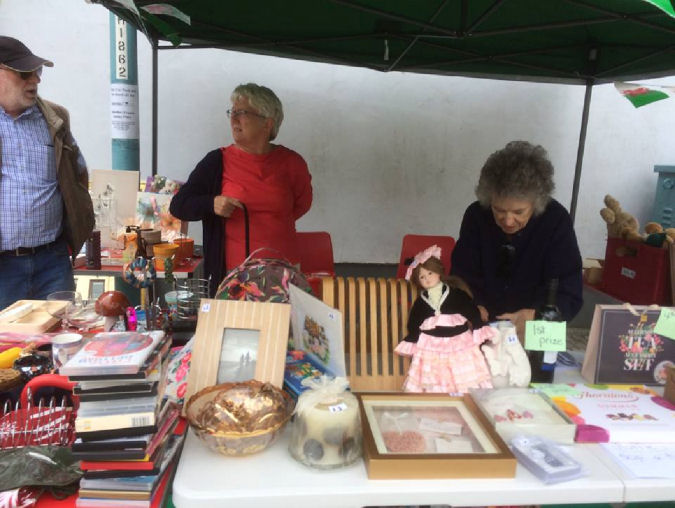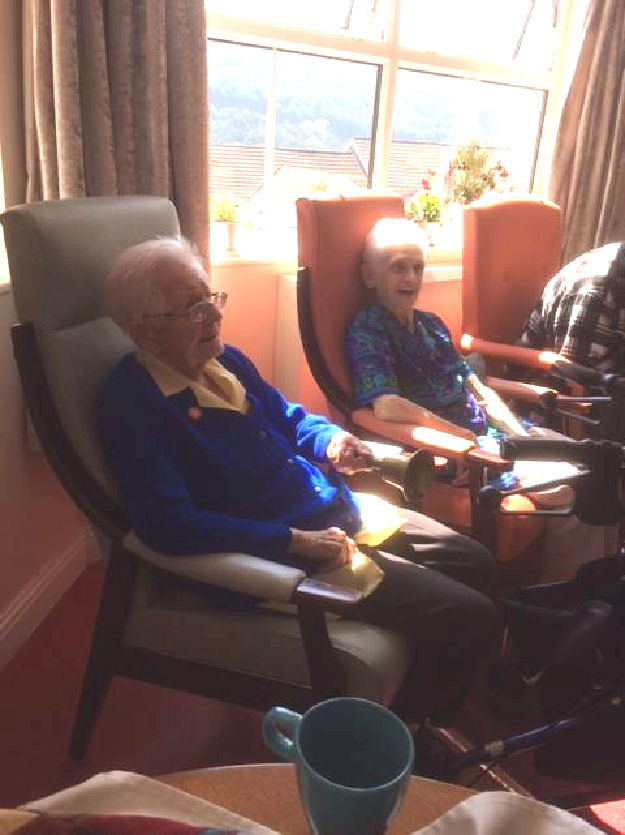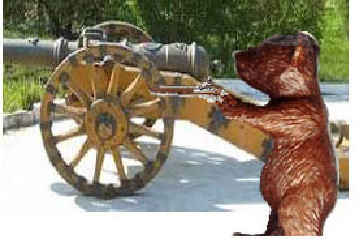Dates for your Diary
Ongoing – WW1 Exhibition in the Museum
Saturday 21st July – Coffee Morning - School Days
June 100 Club
No. 110 Margaret Evans £20
No. 45 Mary Roden £10
If you would like to join our 100 club and be in with a chance of winning, it costs just £1 a month. Ask at the museum for further details.
Aberfest
We had over thirty children take part in our ‘Bear Hunt’ at the museum at Aberfest on 9th June, which was great, however our Teddy Bears Picnic did not have the uptake that we would have liked. Nonetheless we did make £70 for the museum and every little helps.

Food Hygiene Course
The food hygiene course held on 18th June was a huge success. Our tutor, Janelle, quickly put everyone at ease and made the course both interesting and fun. We even had a game of ‘Who Wants to be a Millionaire’ where all the questions were food hygiene related of course! Many thanks to her and Adult Learning Wales for a great learning experience. Hopefully, other courses will follow in due course.
Newsletter Archive
Did you know that previous editions of this newsletter, right back to August 2007, can be read on the museum website?
Simply go to our website:
www.abertilleryanddistrictmuseum.org.uk
and look for the Newsletter link. Then use the arrow to navigate to previous editions.
Second Visit to Penybont Care Home
 On Wednesday 23rd May Jen and I were asked back to Penybont Care Home to talk to the residents there. This time we decided to talk about school life. We were greeted by a queue outside the lounge of residents trying to get in. The room was full. Fame at last!
On Wednesday 23rd May Jen and I were asked back to Penybont Care Home to talk to the residents there. This time we decided to talk about school life. We were greeted by a queue outside the lounge of residents trying to get in. The room was full. Fame at last!
We started with ringing the school bell. Everyone remembered this sound and running as fast as you could to get into lines in the school play yard whatever the weather. Placing your hands on the shoulders and stretching them out so you were equidistant from the pupil in front. All hands and nails were checked for cleanliness by the teacher before you were allowed into the classroom.
Our next item was the cane. How much more brutal school must have been in past times. Use of the cane, ruler, daps, board rubbers or tweaks behind the ears for minor offences. It was remembered having the cane for talking in class, for having dirty nails, not wearing uniform, for not wanting to go out in the heavy rain at playtime and for humming a well known tune when you should have been listening. One lady remembered mutching school with six others but they were caught and made an example of with a caning. Her father when he saw the marks on her legs went up to the school ready for a fight saying only he would hit his daughter. She never mutched again to find out what would happen. Some who received the cane thought perhaps they deserved it; others were not so sure.
Our third item was pens and ink. It was remembered using these and trying hard not to make blots. The monitor system was remembered. How the good pupils were chosen to fill the ink pots in the desks in the morning from the large earthenware jar. Or being a milk monitor bringing in the crates of milk, a third of a pint* for every child, and in cold weather putting them by the open fire or stove to thaw before sticking a straw in the top and giving them out. Funny how only the women could remember being monitors???
School dinners were remembered with great affection- meat, vegetables and gravy followed by milk pudding or something with custard. This was often the one meal they had in a day.
We showed school uniform and school photographs. The residents had been to many different schools - London, Fleur de Lys, Newport as well as the local schools. It was obvious that although times were hard schooldays were remembered with affection.
It was time to ring the bell again for the end of the day. Will we be asked back a third time? Watch this space!
Judith Williams
*Editor’s note – we have two of these one third pint milk bottles on display at the museum and they came from my grandfather Wayne’s Penybont dairy.
Can you read this?
If yuo cna raed tihs, yuo hvae a sgtrane mnid too. Can yuo raed tihs? Olny 55 plepoe out of 100 can.
I cluod not blveiee taht I cluod aulaclty uesdnatnrd waht I was rdanieg. The phaonmneal pweor of the hmuan mnid, is scuh taht, aoccdrnig to rscheearch at Cmabrigde Uinervtisy, it dseno't mtaetr in waht oerdr the ltteres in a wrod are, the olny iproamtnt tihng is taht the frsit and lsat ltteer be in the rghit pclae. The rset can be a taotl mses and you can sitll raed it whotuit a pboerlm. Tihs is bcuseae the huamn mnid deos not raed ervey lteter by istlef, but the wrod as a wlohe. Azanmig huh? Yaeh and I awlyas tghuhot slpeling was ipmorantt!
Palma Airport
In the July 2017 issue of this newsletter I told you about my parents antics in Malta in 1979. Well it wasn’t the last time they were to get in trouble abroad…!
In the mid ‘80’s my parents, Tom and Betty Wayne, went on a holiday to Majorca. They were landing back home at Rhoose airport and my sister was there to meet them. The first thing she saw was my mother coming towards her with her arm all bandaged up! It transpired the holiday itself had been enjoyable but uneventful. The problems began when it was time to go home….!
The coach had arrived at the hotel to take them to the massive, Palma airport. They put their luggage in the coaches hold and my mother had boarded the coach at the front entrance and was making her way down the bus when the driver pulled away. This bus had a second door with a set of steps halfway down the bus and when the driver pulled off, she fell backwards down these steps hurting her arm quite badly as she fell. Concerned it may be broken, the holiday rep immediately called for an ambulance, which arrived quite quickly and off they sped to the local hospital with just their flight bag with passports, tickets and, fortunately, their travel insurance!
At the hospital, mum’s arm was X-rayed and found not to be broken but badly sprained. So she was bandaged up and after sorting out the paperwork with regards to the travel insurance, they were able to make their way outside in search of a taxi to get them to the airport.
The taxi driver got them to the airport as quickly as he could but by the time they were dropped outside the terminal it would have been boarding time and yet they had not even checked in and they had no idea where their luggage was. The taxi driver left and they entered the terminal building to find it virtually empty bar a for few staff dotted about the huge hall. They approached one after another but none could speak English. Eventually they found one person that could. It seems that the taxi driver had dropped them at the wrong terminal. Where they were was the terminal used by the locals hence no English speaking staff!
“Quick quick, come with me”, this lady said and they followed her for what seemed like miles. Every now and then she would stop and speak to someone in Spanish and they would shake their head and they would move on.
Eventually she reached one gentleman who nodded and she told my parents “Go with him”. They set off once more at a fast walk, half run until finally he led them to a door and, as they passed through, they found themselves out on the runway! He pointed to a nearby plane where the last few passengers were boarding, and indicated for them to join the back of the queue.
How they got on board with no questions asked is a mystery, remember they had not checked in, nor shown their passports to anyone and neither of them had a boarding pass! But board they did; they found two empty seats and, hoping against hope, that it was the right flight, they buckled up! It was the right flight but of course when they landed, their luggage was nowhere to be found!
All this was related to my sister as they travelled home in the car and on the way back they called in the travel agents where the holiday had been booked. They explained they had no idea where their luggage was so the assistant in the shop rang her counterpart in Majorca to see what she could find out. “Oh yes” came the voice over the phone, “Mr and Mrs Wayne never made the flight, they are still out here” whereupon the assistant replied “Oh no they’re not, they’re standing right in front of me!” There was an astonished silence at the other end of the line!
Their luggage was put on the next available flight and they were reunited with it a day or two later. Of course, how they boarded that plane would never be allowed to happen today….would it?
If you know different, do tell! Email me at sallymurphy@talktalk.net.
Sally Murphy
Happy Birthday
Please join with me in wishing a very happy birthday to museum member, Mrs Vera Smith, who turns 90 this month!
Emergency Services
If you find yourself in need of emergency help but have no mobile phone signal, dial 112 and your mobile will search ANY existing network available to contact the emergency number for you. 112 can be dialled even if the keypad is locked, works on all phones worldwide and is absolutely free.
Museum Matters
In our museum collection is a picture of the old barn also the first Non Conformist meeting house in Abertillery founded by John ap John who had been at the siege of Raglan Castle, with General Fairfax.
During the reign of King Stephen (1135 - 1154 A.D.), eleven hundred castles were built by the powerful Norman barons. Because Stephen was a weak ruler, unfit for his position, England allowed them to do as they pleased, and each one built as many of these fortresses as he could afford, and filled them with violent men who assisted him to plunder his neighbours who were not as strong as himself. Such castles in Monmouthshire required to be strongholds indeed, to resist, not merely an attack from another baron, but the constant onslaughts of the Welsh, with whom there was seldom a long or settled peace.
One of these Norman barons one of the leading chiefs belonged to a family known as the Clares. He considered Raglan an excellent site for his purpose ; on the hill he erected a citadel which forms one of the finest parts of the ruin to-day. Its walls were ten feet thick. A canal termed the moat, surrounded it, and for people inside such a tower would, and could, with good reason, regard themselves as being secure in the event of hostilities.
For centuries afterwards, each new owner added suitable buildings by its side. During the Wars of the Roses, records show that the Castle was in the possession of the Earl of Pembroke, who, in the reign of Edward IV., detained the young Earl, of Richmond, afterwards Henry VII. here, in captivity, for several years. Half a century later, the whole property passed to the Worcester family. In 1642, the Civil War broke out between Charles I. and his people. Monmouthshire became the scene of hostilities, an agricultural county, and was filled with conservative element and ideas, and strongly opposed to sudden changes to those accepted by the Puritans the majority of them sided with their King.
The leading members of most of our county families enrolled themselves as officers in the Royal cause and commanded their own armed companies, composed chiefly of their tenants and friends. The Parliamentary troops, termed Roundheads, eventually swept through the southern and eastern parts of the county and subdued them. They captured Usk, Monmouth, etc., from the Royalists, but the greatest obstacle to their progress was Raglan Castle.
The 85 year old Marquis of Worcester, who was immensely rich, raised and kept, at his own expense, 2,000 soldiers, and with them, prepared to defend, not only the Castle.
The King was hopelessly beaten at Naseby in 1645, and for many months was a fugitive. Monmouthshire was his last hope. A large and well-appointed force surrounded the Castle and closely invested it, cutting off further supplies of food, etc., though doubtless the Castle had been well provisioned, whether fully prepared or not, the besieged were now compelled to abandon all hope of further assistance in this way; and constant assaults must have made serious inroads both upon their strength and stores. The rigorous confinement lasted for eleven weeks and might have continued for a much longer period but for a diplomatic stroke on the part of Sir Thomas Fairfax.
Conscious of his own power, Fairfax dictated a letter to the Marquis, in which he laid before him the true and real state of the Royalist cause, and the hopelessness of further resistance to the popular side ; in short, that humiliating terms would not be imposed upon him if he yielded. The Marquis replied that he “would rather die nobly, than betray his cause.” An inventory of his stores however seemed to assure him that they could last for a week. Negotiations continued for a few days, and resulted in the Marquis offering to surrender upon conditions honourable to himself and the garrison. The treaty was signed at Cefntilla House, on the 19th August, 1646 ; the aged Marquis and his force marched out of the famous stronghold with all the honours of war, and the place was occupied by the victors, who now considered that their promises were no longer binding upon them. The Marquis was arrested within a week and sent to London, closely guarded ; there he died before the close of the year.
Meanwhile there was no restraining hand among the victors at the Castle; no one possessed sufficient influence with Fairfax to make him exercise proper restraint over the excesses of his zealous followers, and the Castle was pillaged of everything valuable. The soldiers bored a mine under the stately Tower of Gwent, with the intention of blowing it up completely, as was their custom elsewhere, in this they failed, and an attempt to bombard it gave little satisfaction, one side alone being partially destroyed. They did all the harm possible to many other parts of the fortress, probably with the object of preventing it from being used as a military base upon any similar occasion in the future.
The most serious loss in the spoliation of the Castle and its contents was undoubtedly that of the magnificent library one of the finest extant at that period. It contained a collection of Welsh manuscripts which had been made when the Castle belonged to the Herberts who figured in Welsh literature as leaders of the Yorkist party under Edward IV.
The estate was confiscated, and the grounds ruined in wanton sport. At the Restoration, it reverted to the Worcester family, but the Castle has since remained vacant.
Don Bearcroft, Curator

Top Of Page


